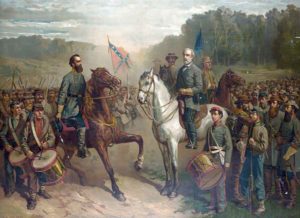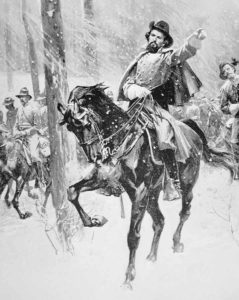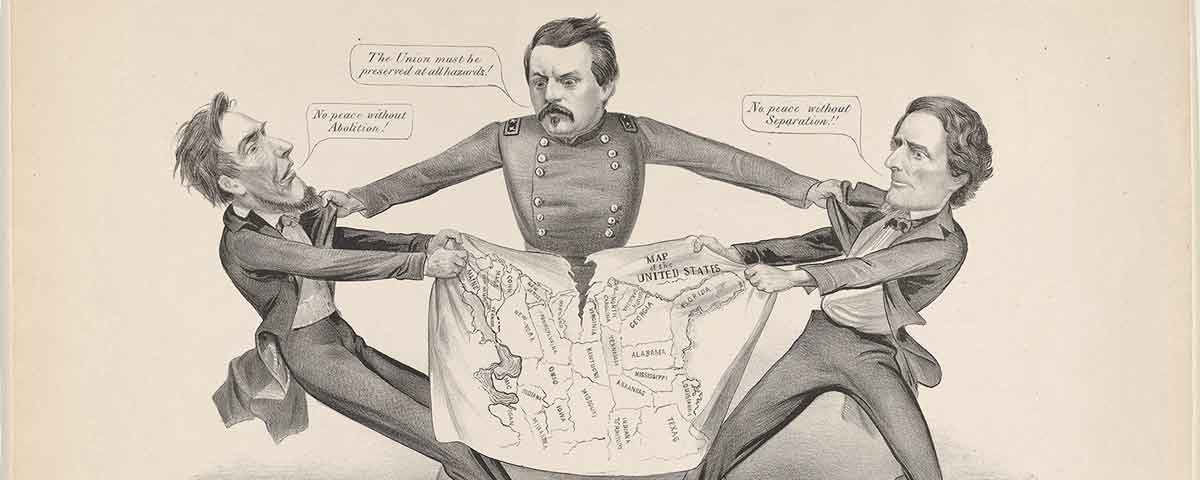Even in our contentious times, Americans from opposite sides of the Mason-Dixon Line are capable of enjoying moments of levity over “The Late Unpleasantness,” “The War of Northern Aggression,” and other such playful labels for that war fought between 1861 and 1865. By contrast, there is often a very serious tone to the contention that the proper nomenclature should be “War Between the States” and not “Civil War.” According to WBTS partisans, “Civil War” is not accurate because it implies that the United States was a consolidated nation in 1861 (as opposed to a federation of sovereign states) and that the seceded states in the South were fighting for control of that nation.
Those who insist that “Civil War” misrepresents the nature of the war and the Confederate cause confront the inconvenient truth that many Confederates used “civil war” (usually lower case) before, during, and after the war.
“I see no cause of disunion, strife, and civil war and pray it may be averted,” Robert E. Lee wrote to a friend on January 22, 1861. The following day he wrote to his family: “As far as I can judge by the papers, we are between a state of anarchy and civil war.” The day before he resigned his seat in the U.S. Senate in January 1861, Lee’s future commander-in-chief, Jefferson Davis, worried that President Abraham Lincoln would pursue a policy that would “inaugurate a civil war.” On the other hand, Raphael Semmes, who after the war helped popularize “War Between the States,” wrote in February 1861 as he prepared to resign from the U.S. Navy, that “Civil war is a terrible crucible through which to pass character.”

Other Southern men who believed passionately in the righteousness of the Confederate cause used the term civil war as they offered advice about coping with Confederate defeat. “Civil war, such as you have just passed through, naturally engenders feelings of animosity, hatred, and revenge,” Lt. Gen. Nathan Bedford Forrest offered in his farewell address to his troops in 1865. Concluded Edward A. Pollard in his 1866 book The Lost Cause: “Civil wars, like private quarrels, are likely to repeat themselves, where the unsuccessful party has lost the contest only through accident or inadvertence.”
Those men seem to have had in mind an understanding of the term civil war like that found in the 1858 revised edition of Webster’s Dictionary: “A war between the people of the same state or city; opposed to a foreign war.” In 1860-61, except for constitutional theorists and ideologues, most Americans, even Southerners, were accustomed to thinking of the United States as one country, at least in relation to the rest of the world. Civil war seemed an appropriate designation for a war fought within the borders of their country.
In contrast to the common use of civil war, the label “War Between the States” was virtually unknown during the war years. It appears only once in the Official Records, incidentally in a memorandum of a secret January 1865 meeting between Lincoln adviser Francis Blair and Jefferson Davis: “He [Blair] stated, in explanation of his position, that he, being a man of Southern blood, felt very desirous to see the war between the states terminated, and hoped by an interview with me [Davis] to be able to effect something to that end.”

“War Between the States” was a postwar creation, used to put a favorable spin on the Confederate cause. In effect, the name sought to achieve after the fact what the Confederacy failed to win during the war: recognition as a separate nation.
The United Daughters of the Confederacy pursued a campaign to convince Confederate veterans (who were more cavalier in their usage), the press, and the U.S. government to adopt “War Between the States” as the official name of the war. They succeeded largely among early–20th century white Southerners, but, contrary to a persistent urban legend, the U.S. government did not adopt the name; it merely used “war between the states” in occasional resolutions. Even UDC leaders conceded that “[t]his action did not, of course, make the term official.”
“War Between the States” is, like “War of the Rebellion” (the name that appears on the Official Records), a name that offers a partisan judgment about the cause and course of the war. While such partisan names can be useful in discussing the war’s issues, we also need a simple handle to serve as a nonpartisan reference to the war. Even before 1861, that handle has been “Civil War.”
John Coski is the longtime historian at the American Civil War Museum in Richmond. This blog appeared in the December 2017 “Myths & Misunderstandings” section of the museum’s News From the American Civil War Museum blog.





